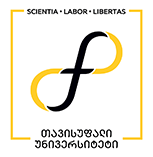Masters in Business Administration in Operations Management
23 აპრილი 2018
School: | Business School ESM |
Programme Title: | Business Administration in Operations Management |
Qualification Awarded: | Master’s in Business Administration Operations Management |
Programme Credits: | 120 ECTS |
Language of Instruction: | Georgian |
Objectives of the Programme:
Operations manager is responsible for the whole cycle of production of goods and services, and for delivering the product to the customer.
Operations manager has to explore ways to improve the services and business processes. For this purpose, the manager monitors and analysis business processes on a daily basis, sets the quality management and control standards, searches for new technologies and ways to raise the overall efficiency.
The goal of Master’s Programme in Business Administration in Operations Management is to create environment for middle and high level managers and analysts/consultants, where they will be able to learn an operations management and its components, to deepen theoretical knowledge in business decision-making process and of business management instruments, acquire better skills for evaluating context, and to address the challenges arisen in the practice.
The programme is oriented for middle and high-level managers and business-analysts/consultants who have the practical experience.
Career Options:
Upon completion the graduates will be able to work as operations managers, occupy higher positions in management and business-analyst/consultation services, they will be able to run the projects and to make investment decisions. Graduates will be able to create and manage their own businesses.
Learning Outcomes:
After completion of Master Program, graduate will own general and specific competencies listed below:
General Competences:
- knowledge of personal qualities of leadership and communication instruments;
- knowledge of methods and techniques of mathematic and economic analyses;
- ability to identify the problems and set the tasks;
- ability to prioritize problems and tasks;
- ability to work in teams and lead the team;
- ability to plan and conduct communications.
Specific Competences:
- possess a solid and systematic knowledge of the fundamental sphere of business – operations management and its components;
- ability to monitor, analyse, interpret and forecast the business processes;
- possess appropriate techniques and information, to solve the complex problems and to have a creative approach.
Competences developed in the program are in accordance with the six criteria for the second level of Higher Education set by the National Qualification Framework:
Knowledge and Understanding:
Graduates of the programme will have a deep and systematic knowledge of the field which enables to generate new ideas, acknowledge the problem solution approaches, in particular:
- theoretical and practical knowledge needed for making business decisions;
- understanding of financial information, knowledge of methods, rules and approaches for preparing financial statements according to the international standards;
- complete knowledge of cost structure in business;
- deep knowledge of budgeting processes of the different types of businesses;
- knowledge of theoretical and practical methods for making decisions that will lead to increased value of the company;
- knowledge of theoretical and practical methods to evaluate investment projects;
- understanding the role of the methods of marketing concepts in the process of business management and knowledge of planning marketing tactics;
- deep knowledge of tactical and strategic management topics;
- understanding of complexity, typology and nature of business transactions;
- fundamental knowledge of principles of human recourse management;
- knowledge of the service and manufacturing operations, design, planning, control and improvement techniques
- knowledge of the different factors affecting decision-making;
- understanding importance of the mathematical models in the decision-making process;
- knowledge of the principles in developing new product and related processes;
- knowledge of manufacturing and space planning techniques;
- understanding the importance of statistical control of quality management and processes;
- knowledge of basic aspects of ranging;
- knowledge of quality management principles;
- knowledge of different methods of research.
Applying Knowledge to Practice:
The graduate will be able to act in a new, unforeseen and multidisciplinary environment; search for new and original ways of solving complex problems, including independent research using the latest methods and approaches. In particular, the graduate will be able to:
- make right tactical or strategic decisions based on the cost statements;
- create operational and financial budgets;
- evaluate investment projects;
- make investment decisions;
- plan and manage business transactions;
- apply theories and concepts of marketing in to practice;
- make managerial decisions regarding the human resources;
- run and lead the whole cycle of the project management;
- manage the process of design, planning, monitoring and improvement of the service and manufacturing operations;
- apply concepts of modelling into practice;
- apply computer simulations and algorithms in decision making process;
- define and classify measurements of business effectiveness;
- manage the process of development quality systems design and use tools and instruments of the control;
- conduct the research.
Ability to Make Conclusion:
The graduate will be able to make grounded conclusions bases on the critical analysis of complex and incomplete information (including recent research); to make innovative synthesis based on the recent data. In particular, the graduate will able to:
- create statistic models and solve practical tasks by using those models;
- model business task in the Excel;
- explain and analyse graphically the dynamic of market processes;
- monitor, explain and analyse the market prices and other important indicators;
- conduct mathematical and economic analysis using standard programming tools;
- evaluate and make conclusions of presentations and business communications;
- analyse different types of cost statement systems;
- apply quantitative and qualitative skills to determine various managerial or operational problems;
- analyse the results and make appropriate statistical conclusions;
- analyse theories of micro and macroeconomics;
- identify, evaluate and manage financial risks;
- make critical analysis;
- conduct quantitative and qualitative analysis of quality management;
- analyse results of made decisions.
Communication Skills
The graduate will be able to communicate own conclusions, arguments and research methods with the academic and professional staff on Georgian and foreign languages, considering academic ethical norms and modern information and communication technologies. In particular, the graduate will be able to:
- work in teams and lead the team;
- conduct communication on business transactions;
- conduct communication on investment decisions;
- manage interpersonal relations;
- communicate with the investors;
- master presentation and public speaking skills.
Ability to Learn
The graduate will be able to conduct the learning process independently, to understand characteristics of the learning process and make own strategic plan. In particular, will be able to:
- update knowledge on a regular basis;
- find appropriate sources and resources.
Values
The graduate will be able to evaluate values and contribute to the establishment of new values. In particular, the graduate will:
- acknowledge and share free market ideas;
- share private ownership principles;
- share principles of liberal democracy;
- appreciate differences and cultural diversity;
- carry out business activities with professional responsibility;
- acknowledge and share principles of business and corporate ethics.
Full description of the programme
Curriculum of the programme




